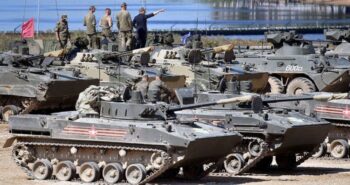By Lisa Watanabe
This study looks at several types of key Islamist actors. Among the political Islamists, it examines mainstream Islamists, such as the Muslim Brotherhood in Libya, who have gone the furthest in terms of accepting democratic norms and principles, and are the most pragmatic with regards to the application of sharia law.
PART SEVEN
The Importance of Libya’s Islamists
Political support for the uprising, as well as the role of Islamist-linked revolutionary brigades, helped to grant the Muslim Brotherhood influence in post-Qaddafi governance and parallel security institutions.
Although its political weight has waned since 2014, the UN political process and the institutions created under the UN-brokered LPA have provided vectors of continued influence for the movement.
This influence is likely to diminish further, if modifications to the LPA are implemented. Brotherhood-associated brigades that are loyal to the GNA, especially those in the former Libya Shield forces, also serve to give the Muslim Brotherhood influence.
Should they become incorporated into future police and army structures, this would give the movement associates within these structures, who are sympathetic to its agenda.
LIFG/LIMC veterans never reached the same degree of political relevance as the Muslim Brotherhood, though a few did gain political relevance following the uprising, largely due to aligning with the Muslim Brotherhood.
However, the importance of some former LIFG/LIMC members has been boosted by the significance of powerful brigades commanded by LIFG/LIMC veterans, particularly in Tripoli and eastern Libya.
These brigades have lost some of their weight recently, though. Whether the prominence of LIFG/LIMC veteran commanders will translate into influence within future security structures is likely to depend on how their links to jihadi Salafi actors are perceived.
While Madkhalis, for the most part, did not play a significant role in the uprising, they have taken sides in the civil war. As such, they have succeeded in making themselves relevant to both the GNA and Haftar’s LNA.
This could translate into a future presence within police and army structures. As a result of the political fragmentation of Libya and Haftar’s tolerance of Madkhalism, the latter is also gaining a firmer foothold in the religious sphere in the East, giving its adherents channels through which to continue to increase their following in this party of the country.
In sum, then, the political influence of Islamists, particularly that of Muslim Brotherhood, has declined since 2014. However, the UN political process has provided a channel through which they may remain politically relevant, albeit to a much reduced degree.
Moreover, the importance of brigades associated with Islamist actors has provided them with vectors of influence in the West and the East, which could translate into influence in Libya’s future security structures. Should such brigades become integrated into a unified army structure, their opposing agendas could affect unity within it.
The growth of Madkhalism in the East could also pose challenges to a revived democratic transition in Libya, if undemocratic forces are predominant at any time. It could also reinforce ultra-conservativism in this already more conservative part of the country.
Concluding Remarks
vative political Islamists, notably Salafi parties, are likely remain fairly insignificant in their own right. This leavesfor the nominally quietist Salafi current.
The latter, at least in the Libyan case, continue to grow, with potential for some of its adherents to become radicalized.
While the political influence of Libya’s mainstream Islamists, notably the Muslim Brotherhood and its JCP, was in the immediate post-Qaddafi years, largely due to strong alliances with members of Salafi parties and Salafi-leaning independents in the GNC, their political influence has declined since the civil war began in mid-2014.
That said, most have maintained vectors of influence within the context of the UN-led political process, although their political clout could be further reduced within the context of an effort to revive the UN-led reconciliation process.
The Muslim Brotherhood’s associations with brigades that back the GNA means that it could have some sympathizers within future unified and reformed security structures, should these brigades be integrated into them.
In the event of such a development, the Muslim Brotherhood could have overlapping agendas with parts of Libya’s future “deep state”.
Non-mainstream Islamist actors have generally failed to gain much political traction in Libya.
LIFG/LIMC veterans have garnered limited political support, as representatives of Salafi parties. However, brigades with ties to them have become important actors on the ground in some areas of the country.
The power of these brigades has been reduced recently, though. Nevertheless, it could be possible that LIFG/LIMC veterans might be represented in future security structures, though their links to jihadi Salafi actors could well preclude this from transpiring.
Madkhali brigades that have gained in prominence as a result of the civil war, may also form part of police and army structures in the future, which could add an element of instability due to their opposition to the Muslim Brotherhood.
Their increased following in the East, which is likely to continue to be supported by external actors, including Saudi Arabia, could also lead to the further growth of ultra-conservativism and possibly radicalization in the East, which has historically been a hotbed of violent extremism and foreign fighter recruitment.
Tunisia’s Islamists have been struggling to find their place within a very different context characterized by the existence of established governance structures and a secular state.
Ensuring continued political influence within this context has led to the further moderation of Ennahda, which has become ever more mainstream in terms of its acceptance of civic law and democratic norms and principles.
By contrast, a mismatch between the agendas of the more conservative Salafi parties and the Tunisian context has limited their significance, especially with young Salafis, who may be more inclined to shun politics or even embrace violence.
Although the environments in which Islamists operate within Libya and Tunisia are different, in both countries mainstream Islamists are likely to maintain some, albeit reduced, influence. By contrast, more conservative political Islamists, notably Salafi parties, are likely to remain fairly insignificant in their own right.
This leaves room for the nominally quietist Salafi current. The latter may, at least in the Libyan case, continue to grow, with the potential for some of its adherents to become radicalized
The End
***
Lisa Watanabe – Senior Research Fellow at the Department of Humanities, Social and Political Studies, Institute of Security Studies, Zurich. Specializes in the issues of North Africa and the European Mediterranean.
***
The Center for Security Studies (CSS) at ETH Zurich specializes in research, teaching, and information services in the fields of international relations and security policy. The CSS also acts as a consultant to various political bodies and the general public.
The Center is engaged in research projects with a number of Swiss and international partners, focusing on new risks, European and transatlantic security, strategy and doctrine, state failure and state building, and Swiss foreign and security policy.
____________




